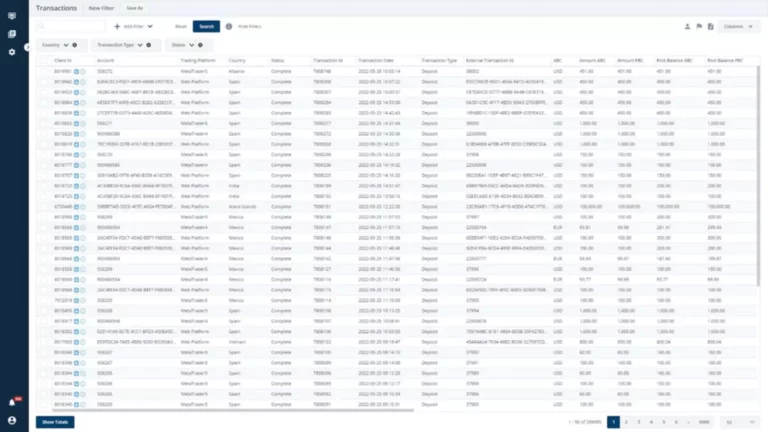Darkish Pool Trading Explained 2023: Complete Investor’s Guide
The rule would require brokerages to send shopper trades to exchanges quite than dark swimming pools except they will execute the trades at a meaningfully higher price than that available within the public market. If carried out, this rule might present a serious problem to the long-term viability of dark swimming pools. Electronic market maker darkish pools are supplied by impartial operators like Getco and Knight, who function as principals for their own accounts. Like the dark swimming pools owned by broker-dealers, their transaction prices aren’t calculated from the NBBO, so there is price discovery. Examples of company broker darkish swimming pools embrace Instinet, Liquidnet, and ITG Posit, whereas exchange-owned dark swimming pools include those offered by BATS Trading and NYSE Euronext.

Naturally, these buyers are averse to the idea of full transparency. If you might be a person investor, you’ll most likely not be in a position to entry dark swimming pools. Most private exchanges often solely enable establishments with huge orders (astronomic relative to retail investors). So, one of the major functions of using dark swimming pools was to guard one’s commerce towards high-frequency automated buying and selling and its predatory practices on public exchanges. However, over time, it grew to become apparent that high-frequency traders were now accessing them as well. For example, in 2016, Barclays agreed to pay $105 million in complete fines for allowing elevated high-frequency buying and selling exercise on its non-public buying and selling system.
Disadvantages Of Darkish Pools
The NBBO is a quoting technique that consolidates the highest bid worth and the lowest asking worth from varied exchanges and buying and selling methods. This mannequin ensures the tightest spread potential while trading the agreed safety. Dark pools have three types, determining the expertise or broker sort used within the execution of block trades. Block trades are high-volume transactions that are privately negotiated and are executed outside the open market.

They also doubtlessly supply worth improvement, as the dearth of instant public disclosure can result in better phrases for both consumers and sellers. Public exchanges operate beneath strict regulatory oversight, making certain that each one trades are seen to investors. Large firms can trade securities with massive volumes without exposing their info to opponents, which preserves their plans or strategies and avoids front-running.
Regulation Of Dark Pools
Just like dark swimming pools in the traditional finance market, darkish cryptocurrency swimming pools can be found on some exchanges, as we beforehand mentioned. Unlike traditional darkish swimming pools, decentralized darkish swimming pools take pleasure in higher and safer verification. Also, crypto dark swimming pools are run by automatic protocols that help keep fairness for all participants and less more probably to be manipulated by unscrupulous gamers. Zero-knowledge proofs and different cryptographic technologies ensure a high diploma of transparency and integrity. Dark pools contain important market players who are more likely to match a block order requested by an institutional investor.
The growing utilization of HFT techniques allows firms to position different small market orders to establish giant trading volumes, capitalise on these opportunities and front-run them. Dark swimming pools exist as a method out for large firms that wish to place huge trading orders that can’t be fulfilled in secondary markets because of liquidity and availability constraints. Some of most of these pools are owned by well-known stock trade marketplaces just like the NYSE’s Euronext and BATS, owned by the Chicago Board of Trade. Strike provides free trial along with subscription to assist merchants, inverstors make higher choices within the stock market. Dark pools aren’t the big dangerous wolves that folks understand them to be.
Benefits Of Using A Dark Pool
For brokers, having their own private change carries a quantity of advantages too. For example, routing orders by way of their inner dark pool would usually be cheaper than routing them through public exchanges. Additionally, their prop desks could easily access the firm’s liquidity within the pool. The core of dark pool operation lies in its capacity to facilitate trades anonymously. When institutional traders wish to purchase or promote large portions, doing so on a public trade may affect the stock’s value. Dark pools are privately held exchanges and markets where large companies and financial establishments commerce various asset lessons and instruments.
Do “Dark Pools” Threaten the Health of America’s Financial Markets? – business.time.com
Do “Dark Pools” Threaten the Health of America’s Financial Markets?.
Posted: Fri, 22 Jun 2012 07:00:00 GMT [source]
However, a lot of the benefits that darkish pools provide don’t apply to small trades. It is doubtful that retail buyers could transfer the market with a single trade, so seeking protection against that could be a non-issue. The initial drawback that dark swimming pools solved is fairly simple to understand—institutions wanting to commerce massive blocks of shares with out worrying about front-running or value of execution. By shielding their moves from the border market, they can get a greater deal. They present an avenue for large institutional investors to commerce giant volumes of shares with out tipping off the market.
What Is A Dark Pool
The major use of a darkish pool is permitting institutional investors to trade large blocks of securities anonymously. For a trade to be thought-about for darkish pools, it must meet sure quantity thresholds. The minimal block measurement necessities are outlined beneath ICE Swap Trade Rulebook. Given the massive volumes of contracts, block merchants usually negotiate for better costs — solely giant monetary institutions like hedge funds, insurance providers, and pension funds. Dark swimming pools are private exchanges for stock transactions that aren’t accessible to most people.

Also known as dark swimming pools of liquidity, the name of those exchanges is a reference to their complete lack of transparency. Dark pool attract high-frequency traders looking to take advantage of market inefficiencies since they function in secrecy. This can lead to elevated volatility and potential price manipulation. Dark swimming pools originated when digital communication networks (ECNs) have been created to match buyers and sellers of securities. ECN networks were initially utilized by brokers to execute trades on behalf of their shoppers. Institutional traders began utilizing these networks to execute massive trades anonymously with the rise of computerized buying and selling.
They differ in a number of elements and may be categorized into three differing types. Dark swimming pools operate based on their very own set of rules and rules, thus offering more personalization. However, it additionally calls for unnecessary fragmentation of data and liquidity. Additionally, front-running retail orders solely turn into an issue when it’s systematic as market makers achieve an advantage in terms of info. Yet the average particular person investor should not be massively concerned about front-running on single orders. While there are lots of negatives that include the concept, dark pools can be beneficial to the market (up to a sure point).

Although stock markets thrive on transparency, not all the data is on the market to the general public. High-frequency trading corporations are especially more likely to benefit from the opaque nature of personal exchanges and have interaction in predatory practices. Although these buying and selling systems are regulated by the SEC, their lack of transparency has turn out to be some extent of competition over time. By doing so, the stocks of the automotive firm will not quickly fall in worth as she sells them. Instead, investors will solely know about the sale once it has been executed. To strengthen our understanding of alternative trading techniques, let us think about the next hypothetical example.
On the open market, massive block gross sales are most likely to lower the stock value, by increasing the provision of the safety obtainable to trade. Dark pools permit massive institutional holders to buy or promote in massive volumes, without broadcasting information that would affect the wider market. The institutional vendor has a better likelihood of finding dark pools finance a purchaser for the full share block in a darkish pool since it is a forum dedicated to giant traders. The risk of worth enchancment also exists if the mid-point of the quoted bid and ask worth is used for the transaction. With options two and three, the risk of a decline within the period while the investor was ready to promote the remaining shares was additionally significant.
ATS provides a platform for buyers to commerce massive blocks of shares without affecting the costs of these shares in the open market. They offer a singular advantage to merchants by offering a platform to execute trades anonymously, which reduces transaction prices and improves price discovery. ATS, especially darkish swimming pools, permit giant institutional traders to trade with out revealing their buying and selling intentions to the general public, which may help to reduce back market impact. ATS additionally provides merchants with the flexibility to execute trades with out having to observe strict rules and regulations that are imposed in conventional stock exchanges. Dark Pools primarily exist to facilitate the trading of massive blocks of securities by institutional investors in order that their large-scale orders don’t influence the markets. The prominent players conduct their gigantic trade behind closed doorways and ensure no disclosures until the transactions are totally executed.
The Way To Trade In Dark Pool?
Dark pools took place primarily to facilitate block trading by institutional investors who did not want to influence the markets with their large orders and obtain antagonistic prices for their trades. Exchange-owned darkish pools allow retail merchants to take part in off-exchange buying and selling. Exchange-owned Dark Pools are recognized to supply a high level of liquidity and are pretty delicate to high-frequency trading practices. In distinction, if such large trades are executed in public exchanges just like the New York Stock Exchange or NASDAQ, it will cause a significant movement within the share costs. Unlike traditional exchanges, particulars of these trades remain secret till after they’re completed.
While they permit giant trades to happen without instant market influence, issues about transparency and fairness persist. They have been created to permit large traders to commerce with out influencing the market price considerably. However, all serve the same basic objective – offering a more private https://www.xcritical.com/, much less impactful approach to execute massive trades. Their purpose is to match client orders with their inventory, aiming for a small profit margin on numerous trades. Others argue that the lack of transparency can lead to discrepancies within the publicly known worth of stocks versus their precise price.
Large traders and financial institutions increasingly choose dark pooling over public marketplaces to safe giant quantities of securities with out inflicting main shifts available within the market. Moreover, these swimming pools involve lower transaction fees as a outcome of they don’t entail a quantity of change platforms and intermediaries. Yes, the SEC regulates Dark Pool Trading, however they’ve limited oversight in comparability with public exchanges. Dark pools usually are not required to reveal their trading volumes or the members of their trades to the basic public, making it troublesome for regulators to monitor them. It is a legitimate buying and selling apply used by many institutional investors. But there have been instances of illegal practices such as front-running, insider buying and selling and value distortion in darkish pools.